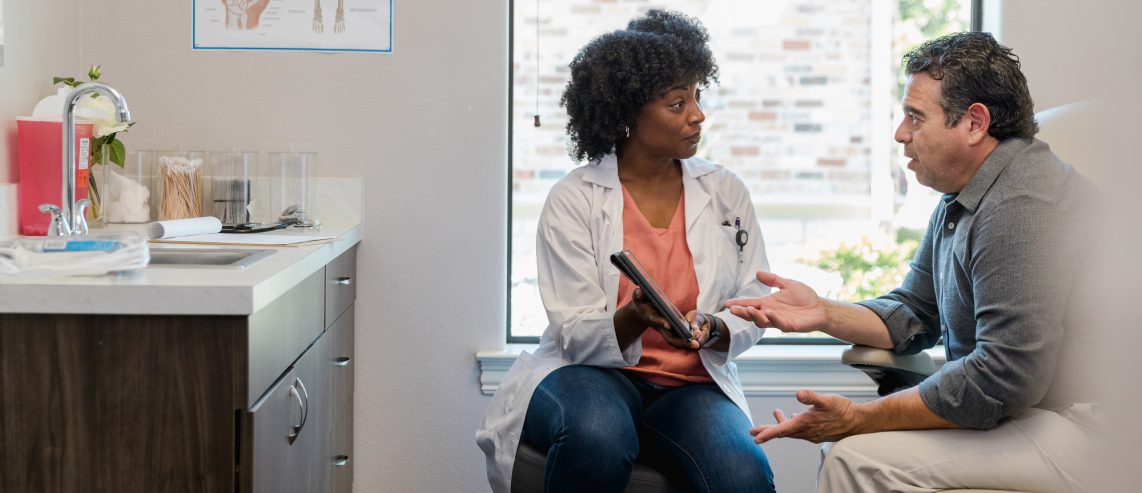Kidney stones can feel very uncomfortable. One in 10 people will have a kidney stone in their lifetime. More than half a million people go to the emergency department for a kidney stone each year. If you’ve been one of them, you know just how excruciating they can feel.
Getting to the bottom of what causes recurring kidney stones can help you stay out of the hospital. It can also help you get on with a life without constant kidney stones. Here’s what you need to know.
What Are Kidney Stones?
Kidney stones are hard objects that form out of crystallized minerals in the kidneys. The stone-forming chemicals in the body are:
- Calcium
- Cystine
- Oxalate
- Phosphate
- Urate
- Xanthine
Certain medical conditions can cause an unusually high level of these chemicals in your urine. These crystals then attract other elements. Together, they create a solid, hard object that may cause urine to back up in the kidney, bladder, ureter, or urethra.
When urine backs up from the blockage, it causes the kidney to swell. This can feel extremely painful.
If your kidney stone is small enough and causes mild (or no) symptoms, you may not even know you have it. You may pass without any pain at all when you urinate.
Increasing fluid intake, especially water, is a common recommendation for kidney stone prevention. Keeping your urine clear helps to stop waste products from becoming too concentrated and forming stones.
Dietary changes can help with kidney stone prevention as well. Don’t make changes to your diet without checking with your doctor first.
Never Miss a Beat!
Subscribe to Our HealthBeat Newsletter!
Thank you for subscribing!
You can now select the specific newsletters you'd like to receive.
You are already subscribed.
Subscribe to more newsletters in our email preference center.
Sorry, an error occurred. Please try again later.
Get Healthy Tips Sent to Your Phone!
What Causes Recurring Kidney Stones?
Recurrent kidney stones are kidney stones that keep returning even after interventions such as dietary changes, medications, or surgery.
People who get recurrent kidney stones include those who:
- Consume a high-protein, low-fiber diet.
- Have a bowel condition or have had bariatric surgery.
- Have a family history of kidney stones.
- Have frequent kidney or urinary tract infections (UTIs).
- Have had a kidney stone before 25 years of age.
- Suffer from chronic dehydration and low urine output.
What Are the Types of Kidney Stones?
There are four types of kidney stones. Treating and preventing recurrent kidney stones depends on your particular type of kidney stone diagnosis.
The four types of kidney stones include:
Calcium stones
Calcium stones, including calcium oxalate and calcium phosphate, are the most common type of kidney stones. Calcium stones account for about 80% of all kidney stones.
Cystine stones
Cystine stones often start to form in childhood as the result of a rare genetic metabolic disorder called cystinuria. They account for less than 1% of all kidney stones. Having too much of the amino acid cystine in the urine causes these stones to form.
Struvite/infection stones
Struvite stones can result from chronic UTIs caused by poor bladder emptying and long-term use of tubes in the kidney or bladder. They account for about 10% of kidney stones.
Uric acid stones
Uric acid kidney stones account for 5% to 10% of all kidney stones. Uric acid crystals don’t dissolve well in acidic urine and form stones. Causes of acidic urine can include obesity, type 2 diabetes, gout, and a diet high in animal protein.
What Are Some Kidney Stone Symptoms?
Some early kidney stone symptoms include:
- Bloody urine.
- Mild pain when you urinate.
- Pressure or pain in your lower back or side.
- A stomachache that doesn’t go away.
- Testicle pain in men.
At-home treatment for a kidney stone can include drinking plenty of water and taking an over-the-counter pain reliever. If your pain worsens and comes with fever, chills, nausea, or vomiting, see your doctor or go to the emergency department.
Treatment options will depend on the type, size, and location of the kidney stone. It’ll also depend on how long you have had it.
Kidney Stone Treatments
The size and location of your kidney stone will determine your treatment. Treatment almost always requires an endourologic procedure. Open surgery for stones is rare in the modern era, and only uric acid stones may respond to medical therapy (and dissolve).
Either one of the following will treat your stone:
Ureteroscopy with laser lithotripsy and stone basketing
A small scope called a ureteroscope enters the ureter, which is the tube that connects the kidney to the bladder. A laser then locates your stone and fragments it.
Small fragments may pass on their own while a small basket instrument removes larger fragments. Usually, a temporary stent then helps the ureter heal and facilitates the passage of smaller, sand-like fragments. This is most often an outpatient procedure.
Percutaneous nephrolithotomy (PCNL)
Larger stones — those larger than 1.5 centimeters and located in the renal pelvis — may need PCNL treatment. A small incision in the back creates a tract to the kidney.
Through this larger working tract, an ultrasonic lithotripter can more efficiently fragment a larger stone. This procedure requires an overnight stay in the hospital.
Sources
About Urology
The UPMC Department of Urology offers a wide variety of specialized care for diseases of the male and female urinary tract and the male reproductive organs, including erectile dysfunction, kidney stones, urinary incontinence, prostate cancer, and more. We have a multifaceted team of physicians and researchers working together to provide the best care to both children and adults. Our team is nationally renowned for expertise in highly specialized technologies and minimally invasive surgical techniques. To find a provider near you, visit our website.

